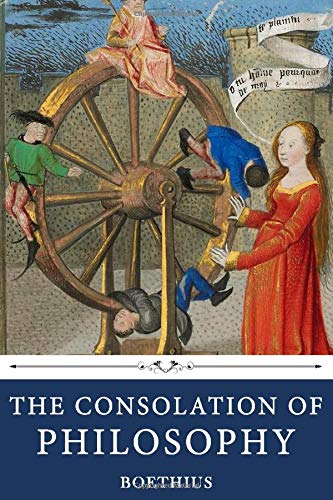The Consolation of Philosophy by Boethius
Boethius
BOOK REVIEW

In a world rife with chaos, The Consolation of Philosophy rises like a beacon, promising clarity in the tumult of life's misfortunes. Written by the philosopher Boethius during his imprisonment, this profound text blends the timeless with the personal, offering insights that resonate through the ages. Here is a work that does not merely inform; it transforms your understanding of suffering, fortune, and the human condition. 📜
Picture this: Boethius, trapped in a cold cell and facing execution, grapples with existential despair. His dialogue with Lady Philosophy merges the rigor of Platonic thought with the compassionate tenderness only a true friend can provide. She has come to remind him that happiness stems not from external circumstances-wealth, status, or popularity-but from the inner wealth of virtue and wisdom. This is not just a philosophical treatise; it's a lifeline, a reminder of what truly matters when the walls begin to close in.
Throughout the pages, Boethius crafts a rich tapestry woven with threads of history, ethics, and metaphysics. He elegantly elucidates the nature of fortune, arguing that misfortune is merely a temporary state-a fleeting shadow that can't extinguish the enduring light of wisdom. Readers often feel a jolt of recognition as Boethius lays bare the illusions of worldly success. Those who lament their lot find solace in knowing that greatness and goodness are not synonymous. 🌌
The compelling arguments presented in The Consolation of Philosophy unfold like a philosophical drama. It's as if Boethius is whispering directly to you-each passage an invitation to reflect on your life's trials and tribulations. "Fortune is a fickle mistress," he warns, urging us to look beyond the surface and seek deeper truths. As his mentor, Lady Philosophy, asserts, "No one is truly unhappy unless they choose to be." This assertion can turn your world upside down.
Unsurprisingly, the response to Boethius's work has been profound. The deepest admirers, including luminaries like Dante, Chaucer, and even Shakespeare, were heavily influenced by his exploration of fate and free will. However, readers have had mixed reactions, ranging from adoration to criticism. Some argue that the heavy philosophical nature makes it a challenging read. Others praise its emotional depth and intellect, citing how it resonates with the human spirit. The veil of despair lifted by Boethius's words leaves many readers craving more-a connection to something larger than themselves.
The historical context of this masterpiece cannot be overlooked. Written in the early 6th century, during a time of political instability and personal despair, Boethius's philosophical wrestling matches the essence of the human experience. He speaks not just to his audience, but also through the ages, confronting modern questions of identity, ethics, and emotional resilience in the face of adversity. Who among us has not faced the storm, questioning our place in a world that seems relentlessly cruel? 🌪
But let's cut to the chase-what's your stake in reading this book? It's not merely about philosophical musings or poetic sophistry; it's an urgent plea for introspection. It demands of you: How do you define your happiness? Are you allowing the whims of fortune to dictate your worth? The Consolation of Philosophy is here to reset your compass, to propel you towards a path that values inner virtue over fleeting trifles.
Dive deep into this text, lose yourself in its words, and emerge transformed. It will challenge complacency, awaken dormant thoughts, and ignite a flame of introspection. This isn't just a book; it's a revolution of the mind, a manifesto for those weary of the chaos around them.
In the end, Boethius's work is a clarion call to take charge of your own happiness. Each chapter carves pathways to resilience, urging you to recognize that true joy springs from within. Let this timeless dialogue resonate within you. Allow it to shake the very foundations of your understanding, leading to an awakening-because the real question is: are you ready to confront the truth about what it means to really live? 🌟
📖 The Consolation of Philosophy by Boethius
✍ by Boethius
🧾 145 pages
2020
#consolation #philosophy #boethius #boethius #Boethius